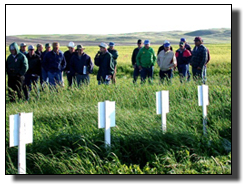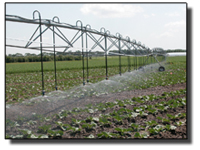Getting the Most from Your Energy Dollar...
Using Energy Wisely on the Farm and Ranch
Energy is one of the more expensive components of raising crops and livestock. In fact in 2005 in Nebraska, ag expenditures rose 10 percent above 2004 costs according to the U.S. Department of Agriculture due in part to rising costs for fuel and fertilizer – which is petroleum-based. An earlier USDA study found nearly half the cost of production was being spent for energy because of rising costs.
In this issue, the Quarterly profiles the Small Farm Energy Primer, Can Renewable Electricity Benefit Rural Communities?, Producing Bioenergy on the Farm, Financial Incentives for Installing Energy Saving Systems and Tips for Reducing Farm Energy Use.
Small Farm Energy Primer
A vintage 1980 publication from the Center for Rural Affairs, Small Farm Energy Primer, is again available to consumers. The 60-page publication contains ideas not widely known or utilized by small farmers in areas such as solar collectors, wind generators, ethanol stills, organic farming and energy conservation.
The Primer is now available on the Energy Office’s web site and on the web site at the Center for Rural Affairs.
 Conversion of the publication to electronic format was provided by the National Center for Appropriate Technology and the New England Small Farm Institute with a grant from the USDA Risk Management Agency.
Conversion of the publication to electronic format was provided by the National Center for Appropriate Technology and the New England Small Farm Institute with a grant from the USDA Risk Management Agency.
Can Renewable Electricity Benefit Rural Communities?
The National Farmers Union has released a report documenting how Renewable Electricity Standards – sometimes called RES or RPS – significantly increase jobs, business activity and local tax revenues, particularly for farmers and rural communities. The paper by Climate Solutions/Harvesting Clean Energy Network Research Director Patrick Mazza, “Energizing Rural America: How Renewable Electricity Standards Generate Rural Economic Prosperity,” highlights key findings from multiple studies documenting benefits from enactment of a 20 percent national renewable electricity standard.
Producing Bioenergy on the Farm
A Harvest Journal article by Patrick Mazza examines two farm-based biofuels projects.
While growing biofuels feedstocks on farms is becoming a commonplace, actually making biofuels on the farm is fairly rare. Two efforts showcase advanced technologies for farm-scale production that illustrate significant potential to produce fuels from local feedstocks for local use. In Corvallis, Oregon a start-up company is working to commercialize a biodiesel microreactor that could serve a small community’s fuel demands with a device that would fit on a bench in a shed. Near Spokane a nonprofit group is developing a farm-scale operation to process agricultural residues into energy products.
Financial Incentives for Installing Energy Saving Systems
The Database of State Incentives for Renewables Efficiency is a state-by-state listing of information on state, local, utility and federal incentives to promote renewable energy and energy efficiency. The resources listed include the agricultural sector.
“Switchgrass as a Bioenergy Crop,” by Lee Rinehart of ATTRA’s National Sustainable Agriculture Information Service, discusses agricultural production aspects of switchgrass. 
“Animal Waste: Future Energy, or Just Hot Air?” is an article by Rachel Oliver for CNN that explains the two ways to turn manure into energy: biodigestors and bioreactors. Farmers using anaerobic digestion on animal waste can provide themselves with methane gas for heat and power; liquid waste for fertilizer (removing the need for petrochemical-produced, environmentally- damaging fertilizers), fibrous matter for animal bedding; and waste heat to warm their homes (and barns).
Tips for Reducing Farm Energy Use Reduces Costs
The University of Nebraska-Lincoln’s Institute of Agriculture and Natural Resources has produced a tip sheet on ways farmers can cut production costs by cutting energy use on their farms. Some energy saving changes are easy to make and many Nebraska farmers are already using energy-saving strategies: